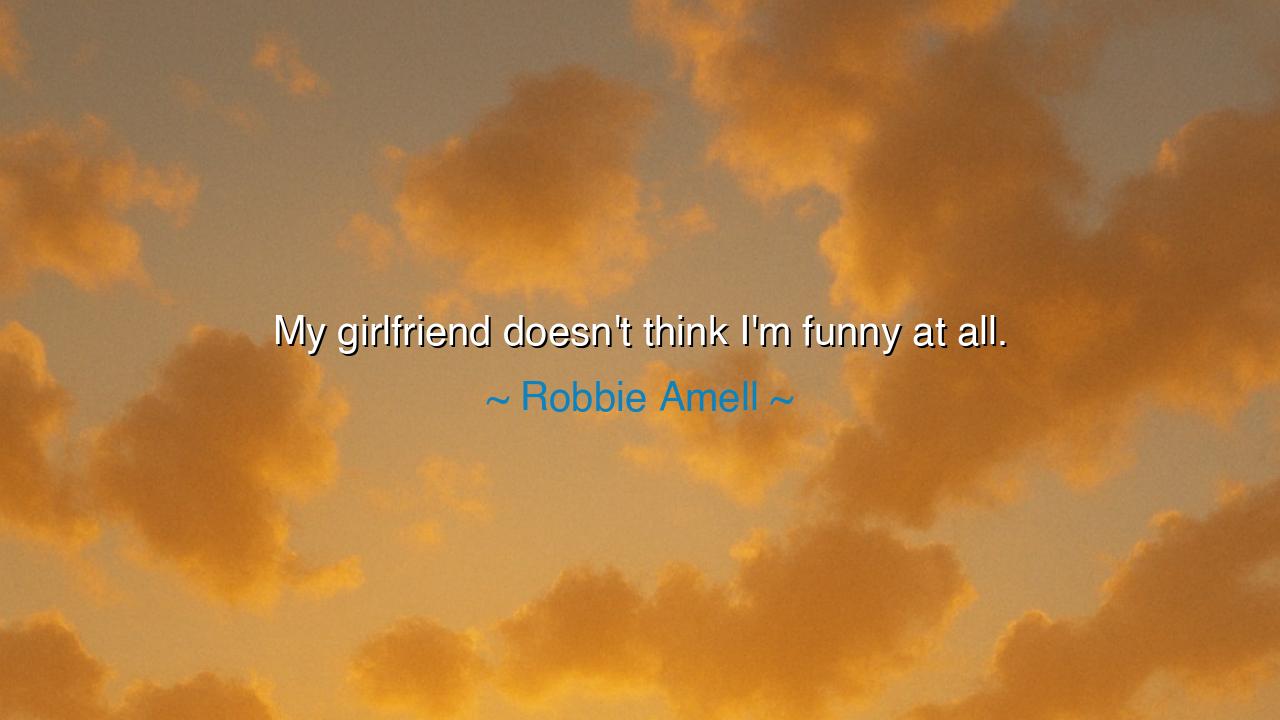
My girlfriend doesn't think I'm funny at all.






When Robbie Amell said, “My girlfriend doesn’t think I’m funny at all,” the words, though simple and wrapped in jest, conceal a deeper truth — one that speaks of the eternal riddle between love and perception, between how we wish to be seen and how we are truly known. For what is humor but an offering of the self, a small fire of joy we light in the hope that another will share its warmth? And what is love but the courage to remain when that fire flickers or fails? In his confession, we hear the echo of an ancient truth: that even in love, there remains a distance between souls, a tender space filled with mystery, humility, and longing.
The ancients would have smiled at these words, for they too knew the bittersweet irony of the human heart. In the scrolls of time, we find the tale of Socrates and Xanthippe, his wife. Socrates, the wisest of men, could stir laughter and thought in the hearts of his students, yet at home, he was said to provoke only sighs and storms. Xanthippe did not laugh at his wit, nor marvel at his endless riddles. But in this, there was truth — for love, unlike admiration, does not always wear the face of amusement. It sees too much, too deeply, to laugh where others might. The beloved, being nearest, perceives the fragile human beneath the mask, and thus, laughter often gives way to something quieter, more enduring — understanding.
When Amell speaks of his girlfriend’s lack of laughter, he unknowingly speaks of authentic love — for laughter, though precious, is but a spark; love is the steady flame that endures when sparks fail. To be loved not for one’s humor, nor charm, nor appearance, but for one’s simple being — that is a gift rarer than any applause. The lover who does not laugh may still listen, still care, still see the soul behind the jest. Her silence, then, is not rejection, but revelation: that love is not the stage, but the hearth; not the performance, but the presence.
Yet there is also humility in his words. Humor, when met with indifference, humbles the spirit. It reminds us that what delights one may fall silent before another — and in that silence, we learn grace. The wise comedian, like the wise philosopher, knows that laughter cannot be demanded. It must be earned through empathy, not performance. In love, as in art, the truest joy lies not in being found amusing, but in being found real. To make another laugh is a gift; to be loved even when one fails to be funny is a miracle.
Consider the story of Charlie Chaplin, who made the whole world laugh, yet in his private life, often felt unseen and misunderstood. The laughter of millions could not fill the quiet spaces where intimacy faltered. Chaplin himself once said, “I like walking in the rain because no one can see me crying.” And thus, Amell’s words, though lighthearted, point toward the same paradox: the performer who seeks laughter learns that laughter fades; only love remains. To be funny is fleeting; to be loved is eternal.
But do not mistake this teaching for despair. There is joy even in being unamused, and beauty in the moments when laughter fails. For when the jest is met with silence, we are offered the chance to meet each other not as clown and audience, but as soul and soul. In those moments, the masks fall away, and we stand together in the sacred vulnerability of truth. Love begins where laughter ends, when we no longer strive to impress but to understand.
So, my listener, take this as your lesson: do not measure your worth by who laughs at your jokes, but by who stands beside you in your quietest hours. Let your humor be an offering, not a plea. Let your love be patient when your light goes unseen. Seek not to be funny, but to be genuine, for reality, in its tender imperfection, is the source of all true connection. And if ever those closest to you do not laugh, smile inwardly and remember — even the gods, when they love deeply, fall silent in awe.
For in the end, to love and not laugh is no failure. It is the recognition that laughter is only one language of the heart — and that the heart, in all its ancient wisdom, speaks many tongues.






AAdministratorAdministrator
Welcome, honored guests. Please leave a comment, we will respond soon